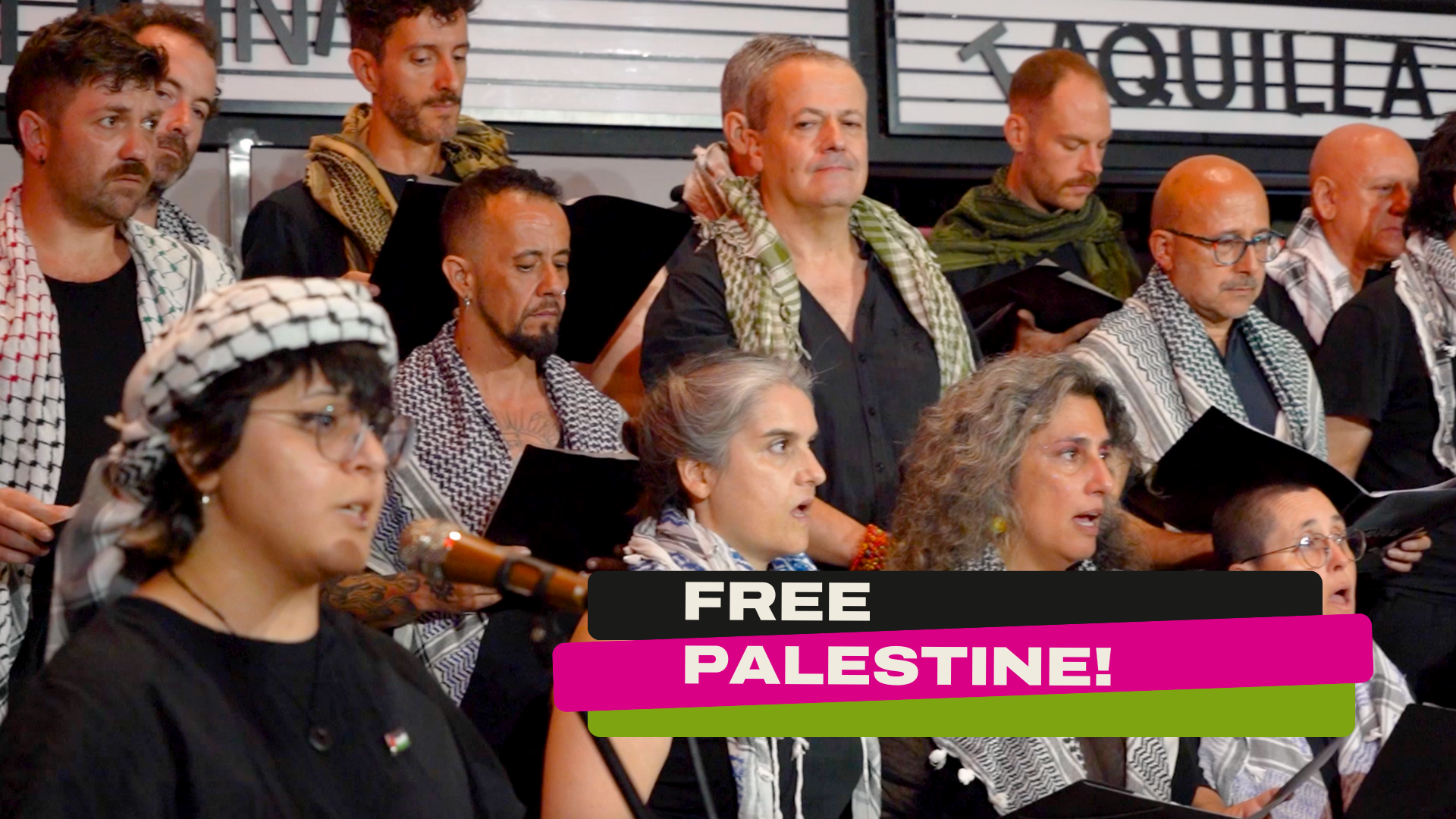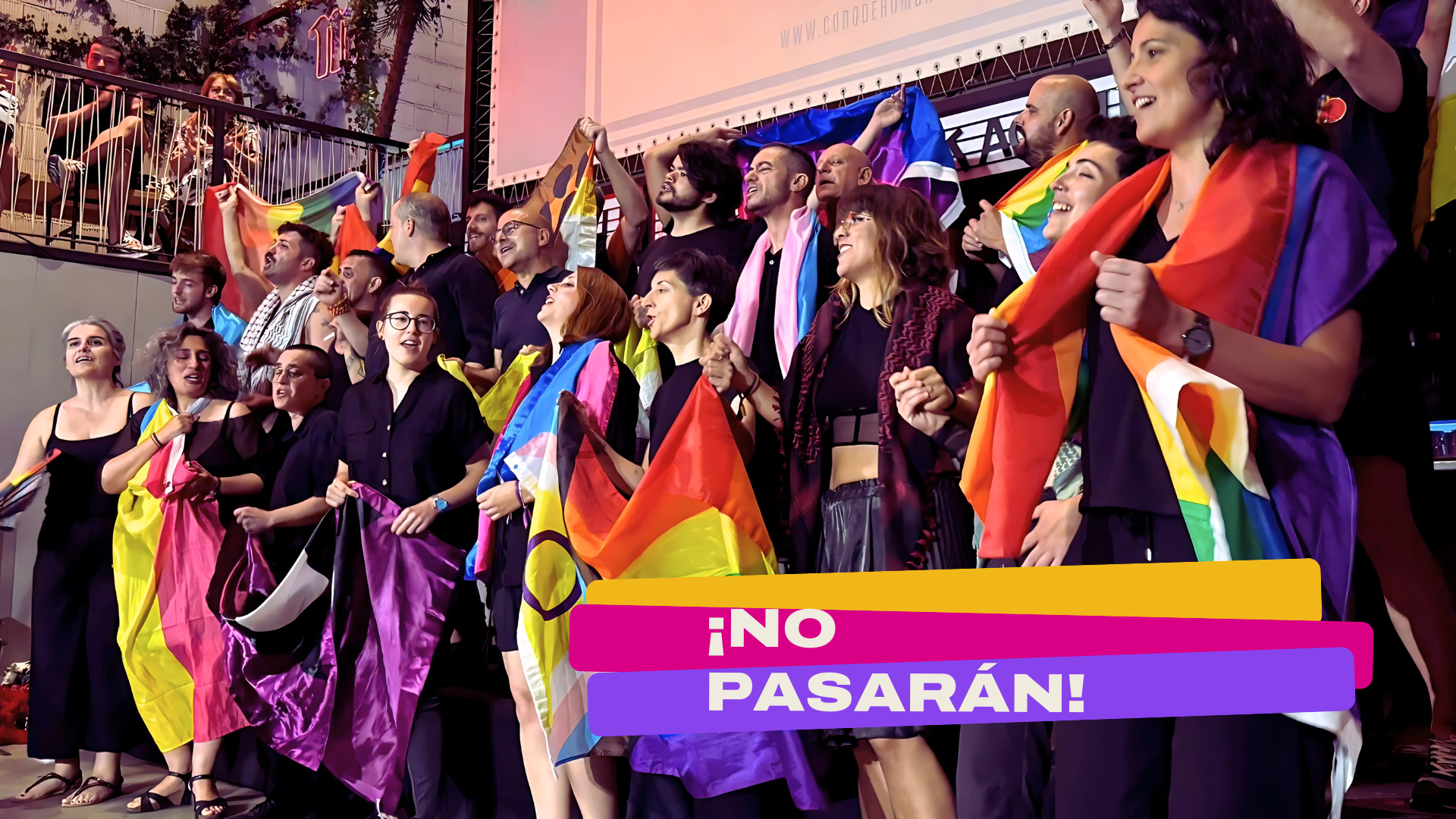Desobediencia civil: una visión con perspectiva cuir desde la música coral
The Amnesty International report “Under Protected and Over Restricted” on the state of the right to protest in 21 European countries highlights many of the restrictions on freedom of expression and assembly that we currently face. As an organization, we believe it is crucial to protect popular protest tools in the pursuit of our civil rights. From the Spanish context, after almost 10 years of the “Gag Law” (Organic Law for the Protection of Citizen Security), we continue to observe a reduction and persecution of our freedom of expression, which we are not willing to accept and against which we continue to position ourselves.
As a choral group, we are excited to contribute to this “Conversation with the Report” by Amnesty International through our artistic perspective with two performances and musical proposals:
To celebrate and claim the historical memory of our collective and our ancestors, highlighting what has been achieved through popular organization and asserting that “pride” is protest.
To show our solidarity and alliance with other oppressions, focusing on the violations of freedom of expression faced by expressions of support, protest, and solidarity for the Palestinian people, while we witness a viralized genocide.
When music becomes protest: Voces LGBTIAQ+ and the right to rise up
Music that protests
At Voces, Madrid’s LGBTIAQ+ choir, we believe music doesn’t just move emotions - it can transform society. A choir is a place where many different voices come together in harmony, and that is also the essence of protest: bodies and voices joining to create pressure, to demand change.
Our protest project was born from this conviction. It found a partner in the University of York’s Art Rights Truth program and Amnesty International, who invited us to respond artistically to their report on the right to protest in Europe. Our answer was what we know to do best: collective art, music that transforms, and historical memory.
Pride is protest
We are a diverse choir of around forty LGBTIAQ+ people with very different lives: young and old, racialized, neurodivergent, disabled, with dissident bodies. What unites us is music, and transfeminism as the foundation of our struggle.
When we sing, it’s not just for aesthetic pleasure. We sing because none of us will be free until all of us are free. Our music seeks to crack open certainties, question dominant narratives, recall past struggles, and strengthen those who continue to resist.
La Pasión de Marsha: Memory and revolt
In June we premiered at Sala Equis in Madrid - an old porn cinema transformed into a cultural bar - our show La Pasión de Marsha: from Stonewall to Palestine, created by our musical director Gonzalo García Baz.
Inspired by the life and faith of Marsha P. Johnson - a Black trans activist and sex worker on the front lines of the Stonewall riots - this work draws a parallel with the Passion of Christ. Just as in Stonewall, today in Spain and across Europe we still face hatred and institutional violence.
With this piece, we remember that the first Pride was a riot - and we still need protest to win and defend our rights. Marsha and Sylvia Rivera remind us that the history of protest is also the history of our very existence.
Singing Palestine: Ya Tal3een
Another key moment of the project was our performance of Ya Tal3een, a Palestinian song of resistance once sung by women to send hidden messages to relatives in prison.
Today, as solidarity with Palestine is criminalized across much of Europe, singing this song becomes an act of disobedience - a global echo of solidarity. With it, we denounce the repression of the right to protest and raise our voices against genocide.
Art transcends walls and borders. This popular song reminds us that even in the darkest times, music can be a tool of freedom.
Different Struggles, One Shared Cry
Our concert wove together many memories and resistances:
Ay Mamá (by Rigoberta Bandini): reclaiming freedom from a feminist perspective, reclaiming the word liberty from political manipulation.
Bella Ciao (Italian popular song): an anti-fascist hymn that continues to inspire those who say: ¡No pasarán! (They shall not pass)
En el pozo María Luisa (Asturian miners’ song): working-class memory and the fight for dignified labor, because workers’ rights are queer rights too.
Terra (by Tanxugueiras): sung in Galician, Basque, Catalan, and Spanish, with a message against cultural erasure and the deadly violence of borders.
Each song is a spark. Together, they create a bonfire of memory and presence: a collective song against the oppressions that shape our lives.
From Stage to Social Media
Protest doesn’t stay inside the concert hall. That’s why we recorded videos of our performances to share on YouTube, Instagram, and Facebook. We want to reach new audiences, spark conversations, and remind people that Pride is protest - on stage and in the streets.
Our Commitment
We believe in art that unsettles, that moves, that mobilizes. In a choir that doesn’t just sing, but sings out loud what cannot be silenced.
The repression of the right to protest in Europe hits hardest those most marginalized: migrants, racialized people, sex workers, Roma communities, and LGBTIAQ+ people. That’s why our work is intersectional: we sing for everyone.
We will keep using music to demand justice, to expose violence, and to imagine freer and more just futures. In our voices live memory, rage, and hope.
What happened at Sala Equis that night was more than a concert - it was a collective act of artistic resistance.
And even though that evening ended, our voices still ring out on every stage and every street where we gather to remind the world:
Pride is protest.
No borders.
They shall not pass.







